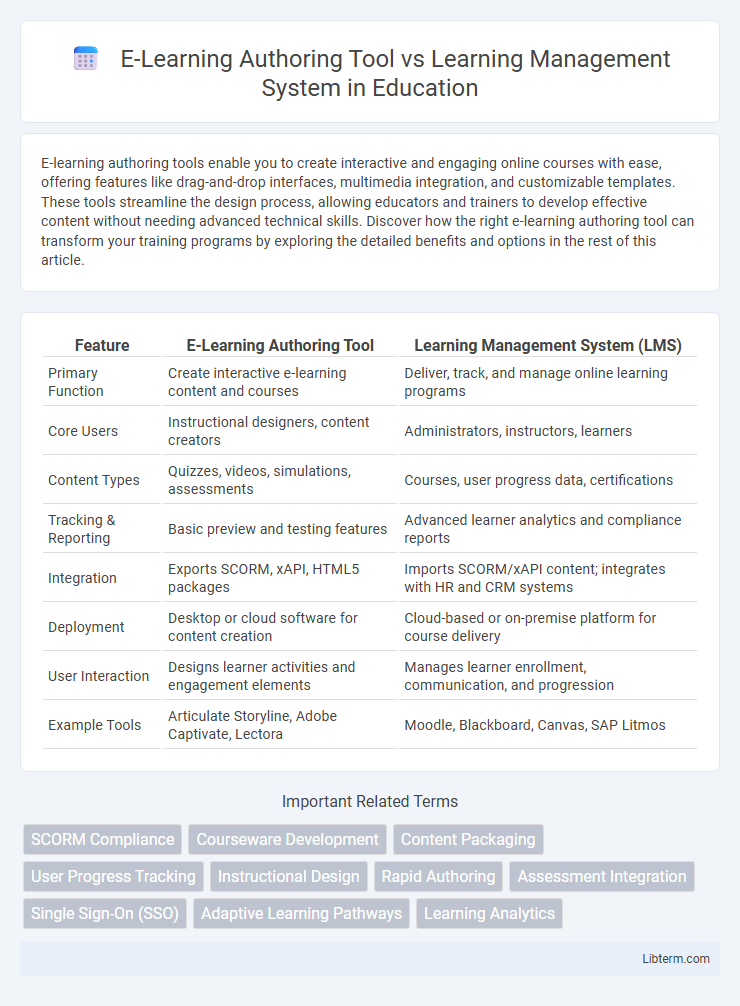E-learning authoring tools enable you to create interactive and engaging online courses with ease, offering features like drag-and-drop interfaces, multimedia integration, and customizable templates. These tools streamline the design process, allowing educators and trainers to develop effective content without needing advanced technical skills. Discover how the right e-learning authoring tool can transform your training programs by exploring the detailed benefits and options in the rest of this article.
Table of Comparison
| Feature | E-Learning Authoring Tool | Learning Management System (LMS) |
|---|---|---|
| Primary Function | Create interactive e-learning content and courses | Deliver, track, and manage online learning programs |
| Core Users | Instructional designers, content creators | Administrators, instructors, learners |
| Content Types | Quizzes, videos, simulations, assessments | Courses, user progress data, certifications |
| Tracking & Reporting | Basic preview and testing features | Advanced learner analytics and compliance reports |
| Integration | Exports SCORM, xAPI, HTML5 packages | Imports SCORM/xAPI content; integrates with HR and CRM systems |
| Deployment | Desktop or cloud software for content creation | Cloud-based or on-premise platform for course delivery |
| User Interaction | Designs learner activities and engagement elements | Manages learner enrollment, communication, and progression |
| Example Tools | Articulate Storyline, Adobe Captivate, Lectora | Moodle, Blackboard, Canvas, SAP Litmos |
Introduction to E-Learning Authoring Tools and Learning Management Systems
E-Learning authoring tools enable content creators to design interactive and multimedia-rich training materials without extensive programming knowledge, supporting formats like SCORM and xAPI for seamless integration. Learning Management Systems (LMS) serve as platforms to deliver, track, and manage these e-learning contents, offering features such as user enrollment, progress monitoring, and assessment management. Understanding the distinct roles of authoring tools in content creation and LMSs in content distribution is crucial for effective e-learning deployment.
What Is an E-Learning Authoring Tool?
An e-learning authoring tool is specialized software designed to create interactive and multimedia-rich online courses, allowing instructional designers to develop engaging content without extensive coding knowledge. It supports the integration of videos, quizzes, simulations, and assessments into a cohesive learning module, enhancing learner engagement and knowledge retention. Unlike a Learning Management System (LMS), which primarily serves as a platform to deliver, track, and manage e-learning courses, an authoring tool focuses on the content creation process itself.
Understanding Learning Management Systems (LMS)
Learning Management Systems (LMS) serve as centralized platforms designed to deliver, track, and manage e-learning courses and training programs, supporting features like user enrollment, progress monitoring, assessments, and reporting. Unlike E-learning Authoring Tools, which focus on content creation and course design, LMS platforms provide the infrastructure to host and distribute learning materials, enable learner interaction, and facilitate administrative control. Key LMS examples include Moodle, Blackboard, and Canvas, offering scalable solutions for corporate, educational, and institutional training environment needs.
Key Features of E-Learning Authoring Tools
E-Learning authoring tools provide essential features such as drag-and-drop interfaces, customizable templates, multimedia integration, and interactive quizzes that facilitate the creation of engaging digital courses. These tools support SCORM and xAPI standards to ensure compatibility with various learning management systems (LMS) for seamless content delivery and tracking. Advanced capabilities like branching scenarios, real-time previews, and mobile responsiveness empower instructional designers to develop immersive and accessible e-learning experiences.
Core Capabilities of Learning Management Systems
Learning Management Systems (LMS) primarily facilitate course delivery, learner enrollment, progress tracking, and assessment management, providing a centralized platform for managing educational content and user data. Core LMS capabilities include user management, compliance tracking, detailed reporting, and integration with external content and tools. Unlike E-Learning Authoring Tools, which focus on content creation, LMS emphasize administration, learner engagement, and performance analytics to enhance the overall learning experience.
E-Learning Authoring Tool vs LMS: Main Differences
E-Learning Authoring Tools are specialized software used to create interactive and multimedia-rich educational content, enabling course designers to develop customized e-learning materials. Learning Management Systems (LMS) serve as platforms for delivering, tracking, and managing online courses and learner progress across organizations. The main difference lies in functionality: authoring tools focus on content creation, while LMS platforms handle course administration, learner enrollment, and performance analytics.
Use Cases: When to Use Authoring Tools vs LMS
E-Learning authoring tools are ideal for creating customized, interactive content such as quizzes, simulations, and multimedia presentations tailored to specific training needs. Learning Management Systems (LMS) excel at delivering, tracking, and managing online courses across large organizations while providing reporting and compliance features. Organizations should use authoring tools during content development phases and rely on LMS platforms for course deployment, user management, and progress monitoring.
Integration Between Authoring Tools and LMS
Integration between e-learning authoring tools and Learning Management Systems (LMS) enhances content delivery by enabling seamless import and export of SCORM, xAPI, and AICC-compliant modules. This synchronization ensures real-time tracking, reporting of learner progress, and consistent user experience across platforms. Efficient interoperability reduces development time, facilitates updates, and supports personalized learning pathways within the LMS environment.
Choosing the Right Solution for Your E-Learning Needs
E-Learning Authoring Tools enable the creation of interactive and customized course content, while Learning Management Systems (LMS) provide a platform for delivering, tracking, and managing e-learning programs. Selecting the right solution depends on your organization's priorities: use authoring tools for content development flexibility and LMS for comprehensive course management and learner analytics. Integration capabilities and scalability are crucial factors when aligning e-learning tools with your training objectives and technical infrastructure.
Future Trends in E-Learning Platforms
E-Learning authoring tools are evolving with AI-driven content creation and adaptive learning features, enhancing personalized and interactive course development. Learning Management Systems (LMS) are integrating advanced analytics, mobile compatibility, and cloud-based solutions to provide seamless, scalable, and data-driven learning experiences. Future trends indicate a convergence of these technologies, emphasizing immersive learning environments using VR/AR and AI-powered automation to optimize learner engagement and outcomes.
E-Learning Authoring Tool Infographic

 libterm.com
libterm.com